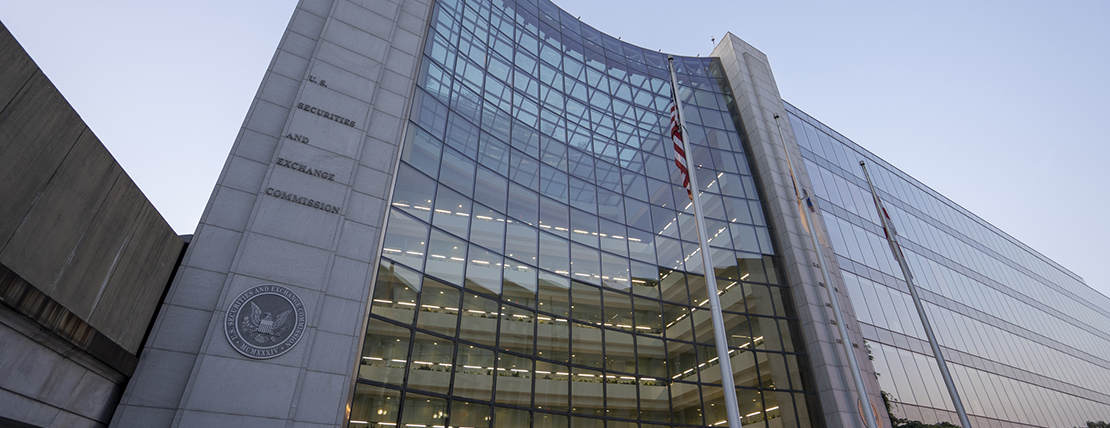For WorldatWork Members
- SEC Pay-Versus-Performance Disclosure: Is It Valued or Is It Costly Information Overload? Journal of Total Rewards article
- Designing Executive Compensation Peer Groups for Maximum Impact, Workspan Magazine article
- Proxy Tables Checklist, tool
For Everyone
- ESG and DEI Remain Fundamental — Even if Compensation Ties are Cut, Workspan Daily article
- Study: Globally, ESG Is Increasingly Tied to Executive Compensation, Workspan Daily article
- ‘Say on Pay’ Data Points to Strong Support for Exec Comp Plans, Workspan Daily article
The U.S. Securities and Exchange Commission (SEC) on Wednesday, Feb. 12, announced it had rescinded Staff Legal Bulletin 14L (SLB 14L) and reinstated guidance put out under the first Trump administration, which companies had referenced when excluding, for instance, proposals tied to environmental, social and governance (ESG) issues on the grounds they constituted micromanagement.
The guidance change occurs as proxy season ramps up for the agency and U.S. corporations.
ESG at the Heart of Guidance Change
The Biden administration issued SLB 14L on Nov. 21, 2021. In doing so, it increased the burden for public companies seeking to exclude shareholder proposals, particularly those related to ESG matters such as climate targets.
Filers generally welcomed SLB 14L upon its introduction, saying it reset “no action” request standards to the “fair and functioning process” they said existed prior to changes by the first Trump administration.
However, ESG shareholder proposals have come under increased scrutiny over the past two years — and especially in the run-up to the 2024 election.
Filers as well as legal and business industry observers forecast the downfall of SLB 14L after Donald Trump won the U.S. Presidential election last November. Those odds rose in January when Republican SEC commissioner Hester Peirce publicly denounced shareholder proposals “that are not aimed at maximizing corporate value.”
Speaking before the Northwestern Securities Regulation Institute on Jan. 27, Peirce stated, “Historically, shareholder proposals were focused on governance topics that had a direct relationship to the financial prospects of a company. … In the past decade, the number of shareholder proposals related to environmental and social issues has risen steadily. The increased volume of pro- and anti-environmental and social proposals should not be mistaken for popularity among voting shareholders. Sorting through the bluster is no small cost for companies. … Not only does each shareholder proposal impose a significant monetary cost, but it also imposes a much larger opportunity cost as management and the board of directors divert their attention away from the day-to-day business of maximizing corporate value to deal with the often-picayune issues at the heart of shareholder proposals.”
Under the SEC’s new/reinstalled guidance, Staff Legal Bulletin 14M (SLB 14M), a shareholder “could continue to raise social or ethical issues in its arguments,” the agency said, but it would need to tie those matters to a significant effect on the company’s business to avoid being excluded by management.
A Bit of Timing Turmoil
The SEC’s action comes as the agency and companies face the brunt of the 2025 annual shareholder proxy season, and as more American corporations are currently scurrying to drop or rein in diversity, equity and inclusion (DEI) initiatives to be in line with Trump’s Executive Order 14173, “Ending Radical and Wasteful Government DEI Programs,” and a follow-up administration memo, “Ending Illegal DEI and DEIA Discrimination and Preferences.”
In a statement posted on the SEC website, Democratic SEC commissioner Caroline Crenshaw criticized the timing of the guidance switch, calling it “arbitrary and inequitable.”
Coming during peak proxy season, the changes would bring new costs to corporations to retool their “no action” requests to exclude proposals, Crenshaw said. However, she added it would have a far more significant impact on shareholders, most of whom will be unable to redesign their proposals this year in line with the new guidance.
“[SLB 14M] moves the goalposts smack dab in the middle of this year’s shareholder proposal process,” she said. “Doing so at this hour creates undue costs and uncertainty for investors and corporations alike. This type of political policy shifting mid-season serves to undercut capital formation, not facilitate it.”
Crenshaw said SLB 14M implements different rules of the road for the process of excluding shareholder proposals from issuers’ proxy statements.
“Such proposals include topics relating to poison pills, compensation, emerging issues such as [artificial intelligence], political and lobbying expenditures, and environmental or other issues that shareholders have identified as materially impacting the firm’s financial value,” she said. “The fact that the change is taking place at this time is significant. As anyone familiar with the shareholder proposal process knows, excluding a proposal from the proxy statement all but guarantees it will never make it to a shareholder vote.”
According to Crenshaw, there will be no winners with the new approach.
“Even for those stakeholders and observers who prefer a different approach to this process, the end result is quite possibly disparate treatment not just for shareholders but for issuers as well,” she said. “We are so focused on undoing the prior commission’s agenda that we sow chaos now. By choosing this path, we forsake all consistency — and perhaps even the legitimacy — of the independent, historically staff-governed process to the detriment of all parties.”
Legal Commentary and Guidance
Over the past week, numerous law firms have publicly commented — and provided advisement — on the SEC changes. Among those:
- A post on the Jenner and Block LLP website stated, “In light of the guidance in new SLB 14M and the rescission of old SLB 14L, a public company will have fewer roadblocks to excluding certain types of shareholder proposals from its proxy statement under Rule 14a-8(i)(5) and Rule 14a-8(i)(7), if the company does not wish to include such [a] proposal in its proxy statement. SLB 14M reflects a shift by the [SEC] staff to a more pro-company framework for shareholder proposals, similar to the approach taken prior to the Gensler era at the SEC.” [Editor’s note: Gary Gensler served as the SEC chairman from April 17, 2021, through Jan. 20, 2025.]
- A post on the Sullivan & Cromwell LLP website stated, “SLB 14M should result in greater success for companies seeking exclusions of shareholder proposals, including ‘ESG’ and ‘anti-ESG’ proposals. Companies that have received one or more shareholder proposals for their upcoming shareholder meetings may wish to review their approach in light of the new staff guidance. Even if a company’s deadline for making a ‘no action’ request has passed, the staff will consider the publication of SLB 14M to be ‘good cause’ for making a late request so long as the legal arguments in the request relate to the new staff guidance.”
- A post on the Wilson Sonsini Goodrich & Rosati website stated, “The timing of SLB 14M creates unusual complexity for those companies currently seeking ‘no action’ relief to exclude a shareholder proposal. SLB 14M notes that the staff will consider the guidance in place at the time it issues its response to a ‘no action’ request. A company with a pending ‘no action’ request may consider the guidance and submit supplemental correspondence to further explain its basis for an exclusion or submit a new basis. A company that is not seeking to raise new legal arguments does not need to resubmit its ‘no action’ request. A company that did not previously submit a ‘no action’ request on a proposal but now believes, based on SLB 14M, that it may have a basis to exclude a proposal may submit a ‘no action’ request.”
Editor’s Note: Additional Content
For more information and resources related to this article, see the pages below, which offer quick access to all WorldatWork content on these topics:








